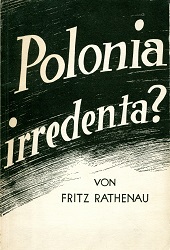Polonia irredenta?
Polonia irredenta?
Author(s): Fritz Rathenau
Subject(s): History, Social Sciences, 19th Century, Pre-WW I & WW I (1900 -1919), Interwar Period (1920 - 1939), Ethnic Minorities Studies
Published by: CEEOL Digital Reproductions / Collections
Keywords: Poles living in Prussia; Polish minority in Prussia;
Summary/Abstract: Only the Prussian constitution of 1848 made the Poles living in Prussia Prussian citizens; they had "no longer to be regarded as Prussian Poles, but as Polish Prussians". The legal situation that was created at that time has fundamentally not changed over the past decades. However, general legal understanding has progressed over time. In particular, the international treaties that ended the World War created the concept of "national minorities" and introduced it into practical politics. The "national minorities" of Prussia and, thus, of the German Reich include those German Reich or Prussian nationals who are willing to preserve and cultivate their own and unique Polish nationality in the foreign state association - according to descent, customs, customs and traditions and to continue to exist within it as a nationally united Polish community. In terms of constitutional law, the Polish minority in Prussia can only be described as “Polish Prussians” in the sense of Prussian nationals of Polish origin. Anyone who possesses Prussian or German nationality — possession of which is a conceptual prerequisite for someone being able to count themselves among the national minorities in Prussia or Germany — cannot at the same time be “Pole”, i.e. non-German; On the other hand, anyone who is Poles, i.e. foreigners, does not belong to the national minority and therefore cannot derive any rights from this characteristic. "Member of a minority" and "foreigner" are two mutually exclusive terms: Every member of the minority is also a citizen of the state in which he resides. A “Prussian Pole” could therefore not exist in itself: because a “Pole” living in Prussia cannot also be a “Prussian” as a foreigner! The antithesis: "Prussian Poles or Polish Prussians?" is therefore legally unfounded and untenable.
Series: CEEOL COLLECTION related to POLAND
- Page Count: 80
- Publication Year: 1932
- Language: German
- eBook-PDF
- Table of Content

